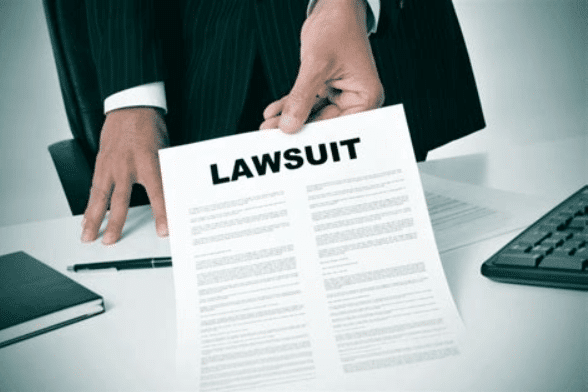RSIEH is a debt collection law firm that specializes in purchasing old debt accounts and collecting on them. If you get sued by RSIEH, Use ZumaZip.com to draft and file your Answer to the case in minutes. You must respond within 35 days (depending on where you live) or you will automatically lose.
If you have been served with a lawsuit from RSIEH (Raush, Sturm, Israel, Enerson & Hornik, LLC), do not panic. This might seem like a scary time, but you do have the option to fight it.
The first mistake that many people make when being sued for debt is to ignore it. Whether this is because they assume they will lose or simply do not have the money, this is always a bad idea. If you do not fight the lawsuit, then you will automatically default and lose your case. Instead, fight the lawsuit, and give yourself a fair chance to reduce or eliminate your case.
In this article, we’ll explain everything you should know about RSIEH, how to respond to a debt collection lawsuit, and how to increase your chances of winning your case.
Who is RSIEH?
RSIEH is an LLC law firm. Commonly known as Rausch Sturm, RSIEH stands for Raush, Sturm, Israel, Enerson and Hornik. Below is RSIEH’s contact information:
Rausch Sturm LLP
250 N. Sunnyslope Road
Suite 300
Brookfield, WI 53005
866-456-3744
rsieh.com
Although this company presents itself as a brand that helps people that fall behind on their debts, they act as a buyer of debt primarily. In addition, RSIEH LLC performs debt collection work, representing financial institutions and creditors for the last 40 years. So, RSIEH is a debt collection law firm that specializes in both purchasing old debts from creditors.
If you have received a letter from RSIEH, it means that a bank or creditor has stated you owe a debt. If you get sued by RSIEH, knowing your rights will help you protect yourself from any unfair collection practices.
Know your rights
The FTC, known as the Federal Trade Commission, enforces the Fair Debt Collection Practices Act (FDCPA). This act makes it illegal for debt collectors to abuse you, and use unfair, or deceptive practices when they collect debts.
Under the FDCPA, debt collectors cannot:
- Call you before 8 a.m. or after 9 p.m.
- Call you at work if your employer doesn’t allow such communications.
- Discuss your debt with anyone other than you, your spouse, or your lawyer.
- Harass you. Meaning they cannot physically threaten you, use obscene language, or call you to annoy you.
- Lie to you about your debt. They may not state you owe an amount different than you owe or lie about being someone other than who they are.
- Falsely claim that you will be arrested if you do not pay the debt.
- Collect interest or fees on top of what you owe, unless it is in your original contract.
- Take or threaten to take your property unless they have a warrant to do so legally.
If RSIEH breaks any of the practices within the FDCPA, you can sue them in either a state or federal court. This can be done within one year of the date the law was violated. Suing means you can get back damages, which includes lost wages and medical bills. If you can not prove damages, then you may be awarded up to $1,000, as well as reimbursement for any attorney ‘s fees and court costs.
RSIEH has bad reviews
If you feel like you’ve been treated unfairly by RSIEH, you’re not alone.
As of 2022, the Better Business Bureau has received 85 complaints against Rausch Sturm in the most recent three-year period. Similarly, the Consumer Financial Protection Bureau reported 165 complaints against RSIEH in the last ten years.
Many of these complaints illustrate examples of RSIEH violating the FDCPA. Let’s take a look at a real complaint from Rausch Sturm’s BBB profile (edited for clarity):
“I had a debt that my job was served garnishment papers for. I was told if I paid in full the garnishment would be stopped. I immediately called Rausch Sturm and paid them in full on 9/15/22. To this day I cannot even get them to follow through with their offer to email me that the account was paid. Each time I called, and I called daily, I was told different statuses of my account. Spoke to a supervisor who lied and said he gave me phone numbers to speak to the “garnishment team” and it ended up being yet another representative who promised to send an email. You cant speak to anyone but representatives and they don’t speak to you like an adult. They tell you things to get you off the phone. I even asked to speak to the attorney who would be signing off on the Satisfaction of Judgement paperwork and they said someone would call me back. I want the garnishment halted immediately and an email and fax to myself and my payroll.”
Like we said before, if you have been treated unfairly and unlawfully by RSIEH, you should report it immediately. When RSIEH sues you for a debt, use your new-found knowledge to respond to the lawsuit and beat them in court.
Send a Debt Validation Letter to RSIEH before they sue
Often if you have an old debt, it has been purchased, sold, and turned over by multiple companies. This means that by the time it reaches the desk of RSIEH LLC, it will have been in the hands of many other companies.
What this means for you is that they may not have any evidence or proof of how you acquired the debt.
You should submit a formal debt verification request to force RSIEH that they have the right to collect the debt and that the amount in question is accurate. You can request a debt verification by sending a Debt Validation Letter to RSIEH.
If you send the letter within 30 days of getting the debt notice, then they are legally obligated to send you written verification of the debt. If they do not have a contract or receipt for how the balance was calculated, then they cannot prove that the debt belongs to you.
The bottom line is that if they cannot prove that you agreed to take on the debt, they cannot legally pursue you for the payment. This means that the first words out of your mouth should always be “show me the evidence of my debt.”
Send a Debt Validation Letter to RSIEH in minutes.
Now, let’s consider an example.
Example: Freddy receives several letters, calls, and emails from RSIEH claiming that he owes a debt. Freddy isn’t familiar with the debt amount, and he wonders if it’s even real at all. After doing some research online, Freday uses ZumaZip to send a Debt Validation Letter to RSIEH. It turns out, RSIEH was trying to contact the wrong person, and when they couldn’t validate the debt, they stopped contacting Freddy.
If RSIEH is able to verify the debt is yours and accurate, then there is a chance they will take you to court to force you to pay it off. When you get sued by a debt collector like Rausch Sturm, the first step to beating them in court is to respond.
Follow these steps to respond to a Rausch Sturm lawsuit
If you are worried about going to court and fighting a lawsuit, this is normal. If you have never stepped foot in a courtroom, then it can be an emotional experience. Despite this, we cannot stress how important this is. Most debts can be easily fought and then either eliminated or reduced. Do not risk losing your case because you are scared.
When RSIEH sues you, you should receive the court documents in the mail known as the Summons and Complaint. The Summons notifies you of the lawsuit, and the Complaint lists the specific claims that RSIEH is making against you.
You need to respond to the Summons and Complaint with a written Answer before your state’s deadline, otherwise you run the risk of losing the case by default. With a default judgment, RSIEH can garnish your wages and put liens on your property. You can avoid a default judgment by responding. Here’s how.
Follow these three steps when you draft an Answer to a Rausch Sturm lawsuit:
- Respond to each claim listed in the Complaint document. The first section of your Answer should focus on responding to each claim against you. You can admit, deny, or deny due to lack of knowledge. Most attorneys recommend that you deny as many claims as possible, which forces RSIEH to prove each claim individually.
- Assert your affirmative defenses. The next section of your Answer should list off your affirmative defenses. An affirmative defense is any legal reason that RSIEH does not have a strong case against you. A common affirmative defense for debt collection lawsuits is that the statute of limitations on debt has expired. We’ll discuss this more below.
- File the Answer with the court, and send a copy to the opposing attorney. After you’ve drafted your Answer with your responses to each claim and affirmative defenses, you’re ready to submit the document to the court. You can send it in the mail, drop it off at the courthouse, or have ZumaZip file it for you. Just be sure to make a copy and send it to the opposing attorney.
Draft and file an Answer in all 50 states with ZumaZip.
The statute of limitations could be your best defense against RSIEH
Similar to needing evidence to pursue a debt, the same goes for the statute of limitations. After a certain amount of time has gone by, the statute of limitations will have expired. This leads to another reason why RSIEH cannot legally enforce you to pay the debt.
The day you fail to make a payment on a debt is the day your statute of limitations begins. This means that you should not make any payment on a debt, nor admit guilt, after being served. If you do, the statute of limitations will start over again.
Time-barred debts
Once the statute of limitations is over, the unpaid debt is considered “time-barred.” This is a great defense option when fighting RSIEH. You may need to bring this up in court during your lawsuit.
If your debt is time-barred, you have two options:
- Pay nothing: It is good to note that although the collector cannot sue you anymore, you still may owe the debt. They do also have the right to continue to contact you. To end this contact you will need to send a letter by mail asking for contact to stop.
- Pay off the debt: If you would like to remove the debt once and for all, you can fight and attempt to pay only some of the debt. This is called a settlement. Be sure to request a signed letter that states how much you are paying, and that they are releasing the debt.
Be aware that although your debt may be time-barred, you still need to respond. In this case, if you ignore a lawsuit, the collector then may be able to obtain a court judgment and garnishment against you. If you go to fight RSIEH in court and tell the judge the debt is time-barred, then you have a better chance of winning your case and avoiding the debt.
What is ZumaZip?
ZumaZip is a convenient solution designed to streamline your response to a debt collection lawsuit. Here’s a breakdown of what you can expect when you use ZumaZip:
Firstly, you’ll access our user-friendly web application, which guides you through the process step by step. You’ll be prompted to answer a series of questions related to your specific situation. Once you’ve completed the questionnaire, you have the option to either print out the finalized forms and mail them to the appropriate courts yourself, or you can opt to utilize ZumaZip’s services to file them on your behalf. Additionally, if you choose this option, an attorney will review your document for added peace of mind.
If you’re seeking guidance on how to effectively respond to a debt collection lawsuit, ZumaZip can provide the assistance you need. Feel free to explore our FAQs for more information on what ZumaZip has to offer.
What if I haven’t been sued yet?
If you’ve only received a collections notice, but not a lawsuit, the best way to respond is with a Debt Validation Letter. When a debt collector contacts you in any way, whether it’s by phone or mail, you can respond by formally requesting a debt validation with a Debt Validation Letter . This letter notifies the collector that you dispute the debt and forces them to provide proof you owe the debt. They can’t call you or continue collecting until they provide validation of the debt. This flowchart shows how you can use a Debt Validation Letter to win.
Get started with a Debt Validation Letter here.
How to Answer a Summons for debt collection in all 50 states
Here’s a list of guides on how to respond to a debt collection lawsuit in each state:
- Alabama
- Alaska
- Arizona
- Arkansas
- California
- Colorado
- Connecticut
- Delaware
- Florida
- Georgia
- Hawaii
- Idaho
- Illinois
- Indiana
- Iowa
- Kansas
- Kentucky
- Louisiana
- Maine
- Maryland
- Massachusetts
- Michigan
- Minnesota
- Mississippi
- Missouri
- Montana
- Nebraska
- Nevada
- New Hampshire
- New Jersey
- New Mexico
- New York
- North Carolina
- North Dakota
- Ohio
- Oklahoma
- Oregon
- Pennsylvania
- Rhode Island
- South Carolina
- South Dakota
- Tennessee
- Texas
- Utah
- Vermont; Vermont (Small Claims court)
- Virginia
- Washington
- West Virginia
- Wisconsin
- Wyoming
Guides on how to beat every debt collector
Hey there! Facing off against a debt collector can feel like a daunting challenge, but fear not! We’re here to help you navigate through it all with our handy guides designed to assist you in beating every debt collector you encounter. Whether you’re facing a new lawsuit or dealing with a persistent collector, we’ve got your back. Stay positive, stay informed, and let’s tackle this together!
- Absolute Resolutions Investments LLC
- Accredited Collection Services
- Alliance One
- Amcol Clmbia
- American Recovery Service
- Asset Acceptance LLC
- Asset Recovery Solutions
- Associated Credit Services
- Autovest LLC
- Cach LLC
- Cavalry SPV I LLC
- Cerastes LLC
- Colinfobur
- Covington Credit
- Crown Asset Management
- CTC Debt Collector
- Cypress Financial Recoveries
- Delanor Kemper & Associates
- Eagle Loan of Ohio
- Educap
- Estate Information Services
- FIA Card Services
- Forster & Garbus
- Freshview Solutions
- Fulton Friedman & Gullace LLP
- Harvest Credit Management
- Howard Lee Schiff
- Hudson & Keyse LLC
- Integras Capital Recovery LLC
- Javitch Block
- Jefferson Capital Systems LLC
- LVNV Funding
- Mannbracken
- Mariner Finance
- Medicredit
- Michael J Adams PC
- Michael J Scott
- Midland Funding LLC
- Mullooly, Jeffrey, Rooney & Flynn
- Mountain Land Collections
- MRS Associates
- National Collegiate Trust
- Nationstar Foreclosure
- Northstar Capital Acquisition
- NCEP LLC
- NRC Collection Agency
- OneMain Financial
- Palisades Collection LLC
- Pallida LLC
- Paragon Revenue Group
- Pinnacle Collections Agency
- PMAB LLC
- Portfolio Recovery Associates
- Provest Law
- PYOD LLC
- Reunion Student Loan Finance Corporation
- Revenue Group
- Regents and Associates
- RSIEH
- Salander Enterprises LLC
- Second Round Sub LLC
- Security Credit Services
- Sherman Financial Group
- Suttell and Hammer
- T-Mobile
- Transworld Systems
- Tulsa Teachers Credit Union
- UCB Collection
- Velo Law Office
- Velocity Investments
- Waypoint Resource Group
- Weinberg and Associates
- Wolpoff & Abramson
Settle your medical debt
Having a health challenge is stressful, but dealing medical debt on top of it is overwhelming. Here are some resources on how to manage medical debt.
- Am I Responsible for My Spouse’s Medical Debt?
- Do I Need a Lawyer for Medical Bills?
- Do I Need a Lawyer to Fight Medical Bill Debt?
- Does Bankruptcy Clear Medical Debt?
- How Much Do Collection Agencies Pay for Medical Debt?
- How to Find Medical Debt Forgiveness Programs
- Is There a Statute of Limitations on Medical Bills?
- Medical Debt Statute of Limitations by State
- Summoned to Court for Medical Bills — What Do I Do?
- Summoned to Court for Medical Bills? What to Do Next
Stop calls from Debt Collectors
Do you keep getting calls from an unknown number, only to realize that it’s a debt collector on the other line? If you’ve been called by any of the following numbers, chances are you have collectors coming after you, and we’ll tell you how to stop them.

































